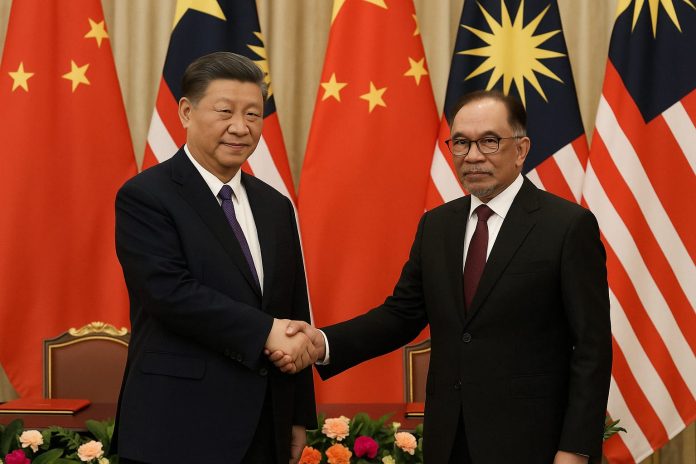By Newspot Nigeria
KUALA LUMPUR— Chinese President Xi Jinping, in a powerful rebuke to rising trade nationalism, declared that China will stand shoulder to shoulder with Malaysia and other Southeast Asian nations in resisting “unilateralism and protectionism,” a veiled swipe at U.S. President Donald Trump’s latest tariff offensive.
Speaking during a state banquet hosted by Malaysian Prime Minister Anwar Ibrahim, Mr. Xi urged regional solidarity to counter what he termed the “backlash of geopolitical rivalry and bloc-based confrontation.” The remarks come just days after the Trump administration hiked tariffs on Chinese imports to 145% and imposed fresh duties on several Association of Southeast Asian Nations (ASEAN) economies, including Malaysia.
“China and Malaysia will stand together with regional countries to counter the tide of geopolitical rivalry and the backlash of unilateralism and protectionism,” Mr. Xi declared, reinforcing China’s commitment to regional cooperation.
Prime Minister Anwar echoed these sentiments, criticizing the erosion of multilateralism. “What we are witnessing today is not an honest reckoning with the imperfections of globalisation, but a retreat into economic tribalism,” he said. “Market access is being weaponised… and the language of cooperation drowned out by threats.”
The two leaders’ joint statements signal a growing alignment amid a shifting geopolitical landscape. In a significant show of deepening ties, China and Malaysia signed 31 agreements spanning defense, global security, and development cooperation.
Mr. Xi’s visit marks the second leg of his Southeast Asian tour, after a stop in Vietnam and ahead of an expected visit to Cambodia. His three-nation trip seeks to strengthen China’s economic and strategic footprint in a region increasingly caught in the crossfire of U.S.-China tensions.
Notably, Mr. Xi also met Malaysia’s monarch, Sultan Ibrahim Iskandar, and pledged China’s support for Malaysia’s 2025 ASEAN chairmanship. As the bloc’s current leader, Malaysia reiterated its commitment to “ASEAN centrality” — the principle that Southeast Asia must shape its own destiny, not be swayed by superpower rivalries.
Malaysia’s foreign policy balancing act is becoming more pronounced. While it continues to engage the United States at multilateral forums, experts say the country is increasingly pivoting toward China, drawn by stability, investment, and a shared non-interventionist stance.
“This visit and the sweeping agreements signed show that Malaysia is quietly but clearly moving into China’s orbit,” said Dr. Lam Choong Wah of the University of Malaya. He warned, however, that this alignment could invite future retaliation once Washington’s 90-day tariff pause lapses.
Despite the risks, both countries appear undeterred. Bilateral trade between China and Malaysia reached RM484.12 billion in 2024, making China Malaysia’s largest trading partner for the 15th consecutive year. At the ASEAN level, China traded US$980 billion with the bloc last year — a testament to the depth of economic interdependence.
Mr. Anwar concluded the banquet by stressing that Malaysia’s relationship with China has always been “respectful and non-coercive,” adding, “We cooperate with those who treat us with respect.”
As the global order reconfigures, Southeast Asia may well emerge as the stage where China’s model of multipolar diplomacy is tested — and perhaps, embraced.
This report was compiled by the foreign affairs desk of Newspot Nigeria.
Share your story or advertise with us: Whatsapp: +2347068606071 Email: info@newspotng.com

















